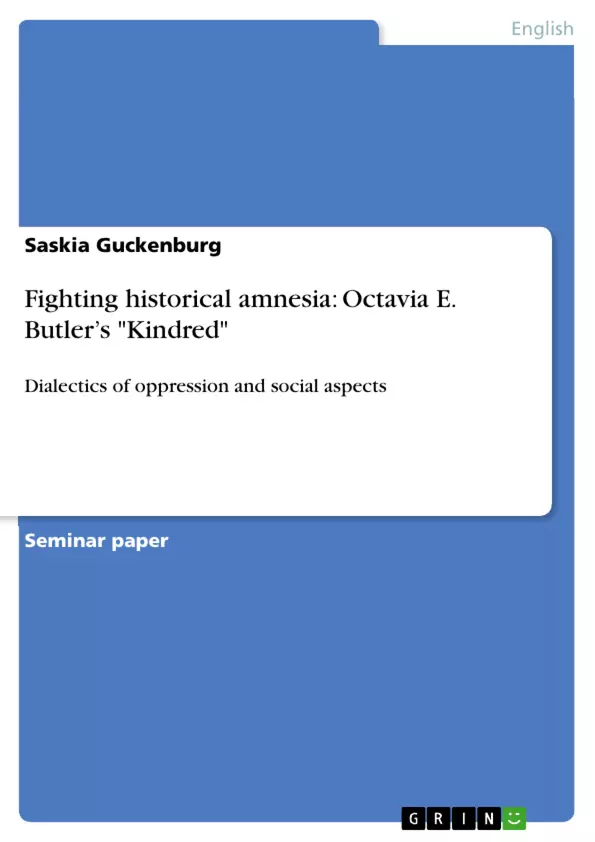Butler states in an interview that she responded to a present sense of shame for older African American generations, who reputedly showed humility towards their white masters: “Kindred was a kind of reaction to some of the things going on during the sixties when people were feeling ashamed of, or more strongly, angry with their parents for not having improved things faster, and I wanted to take a person from today and send that person back to slavery.”
The second chapter focuses on how the problem of historiography of slavery is depicted in Kindred. The third chapter explores the relationships within the slave community as well as towards their master. Jacobs suggests to better understand slavery, one shall “go on a southern plantation, and call yourself a negro trader. Then there will be no concealment; and you will see and hear things that will seem to you impossible among human beings with immortal souls.” Butler chooses a similar way by sending Dana to the antebellum South. Overall, the analysis foregrounds social-emotional issues according to Butler’s intention: “I was trying to get people to feel slavery. I was trying to get across the kind of emotional and psychological stones that slavery threw at people.”
Inhaltsverzeichnis (Table of Contents)
- 1 Introduction
- 2 Handling history
- 2.1 Kindred as accurately fictionalized history
- 2.2 Challenges of history and historiography
- 2.2.1 Missing sources and perspectivism in past and present
- 2.2.2 Contemporary silencing of the historical past
- 2.2.3 Media's misleading influence on the historical memory
- 3 Social complexities of slavery
- 3.1 Threats within the slave community
- 3.2 The meaning of home
- 3.3 Family bonds as bondage
- 3.3.1 The 'happy mammy' as a result of forced accommodation
- 3.3.2 Family love and emotional ties as tools of threat
- 3.4 Master-slave intricacies
- 3.4.1 Rufus' and Dana's “matching strangeness”
- 3.4.2 Further love-hate-relationships
- 3.4.3 Mental manipulations and psychological conditioning
- 3.5 Fear and threat of physical punishment
- 4 Concluding thoughts
Zielsetzung und Themenschwerpunkte (Objectives and Key Themes)
This term paper examines Octavia E. Butler's novel Kindred and its contribution to the debate surrounding the representation of African American history. Butler's work aims to educate readers about the realities of slavery by presenting a vivid and accurate fictionalized account of life on a Maryland plantation during the antebellum period. The novel also explores the complexities of historical memory and the challenges of accurately representing the past, particularly when dealing with traumatic events such as slavery.
- The accurate representation of slavery in fiction
- The impact of historical amnesia on modern understanding of the past
- The social and emotional complexities of slavery for both enslaved people and their masters
- The challenges of interpreting historical sources and perspectives
- The role of media and popular culture in shaping historical narratives
Zusammenfassung der Kapitel (Chapter Summaries)
The first chapter introduces the context for Kindred's publication in 1979, a period marked by intense debate surrounding the portrayal of African American history. The chapter highlights Butler's intention to address the feelings of shame and anger held by some African Americans towards their ancestors for failing to improve their situation more quickly.
The second chapter delves into the novel's approach to history and historiography. It emphasizes the accuracy and detail with which Butler depicts life on a plantation, using references to actual slave narratives such as Incidents in the Life of a Slave Girl and The Narrative of the Life of Frederick Douglass. This chapter also explores the challenges of historical research, particularly the limitations of available sources and the often-narrow perspectives presented in traditional narratives.
The third chapter explores the social complexities of slavery, focusing on the intricate relationships within the slave community and their interactions with their master. It analyzes the psychological and emotional toll of slavery, highlighting the strategies of manipulation and control employed by slave owners.
Schlüsselwörter (Keywords)
The core themes and concepts explored in Kindred include historical amnesia, the complexities of slavery, the challenges of historical research, and the importance of diverse perspectives. The novel also delves into themes of family, love, and the psychological effects of oppression.
Frequently Asked Questions
What is the main theme of Octavia Butler's "Kindred"?
The novel explores the harsh realities of slavery through time travel, aiming to make readers "feel" the emotional and psychological toll of the antebellum South.
Why did Butler send a modern character back to the era of slavery?
Butler wanted to address the shame and anger younger generations felt toward their ancestors, showing how difficult survival and resistance were under the system of slavery.
How does "Kindred" handle historical accuracy?
The novel is considered "accurately fictionalized history," drawing on real slave narratives like those of Frederick Douglass and Harriet Jacobs to depict plantation life.
What are the "social complexities" of slavery mentioned in the text?
It refers to the intricate love-hate relationships between masters and slaves, the use of family bonds as a tool of threat, and the psychological conditioning used to maintain control.
What does "fighting historical amnesia" mean in this context?
It refers to the effort to prevent the erasure or romanticization of the brutal history of slavery in public memory and media.
- Citar trabajo
- B.A. Saskia Guckenburg (Autor), 2013, Fighting historical amnesia: Octavia E. Butler’s "Kindred", Múnich, GRIN Verlag, https://www.grin.com/document/265525



